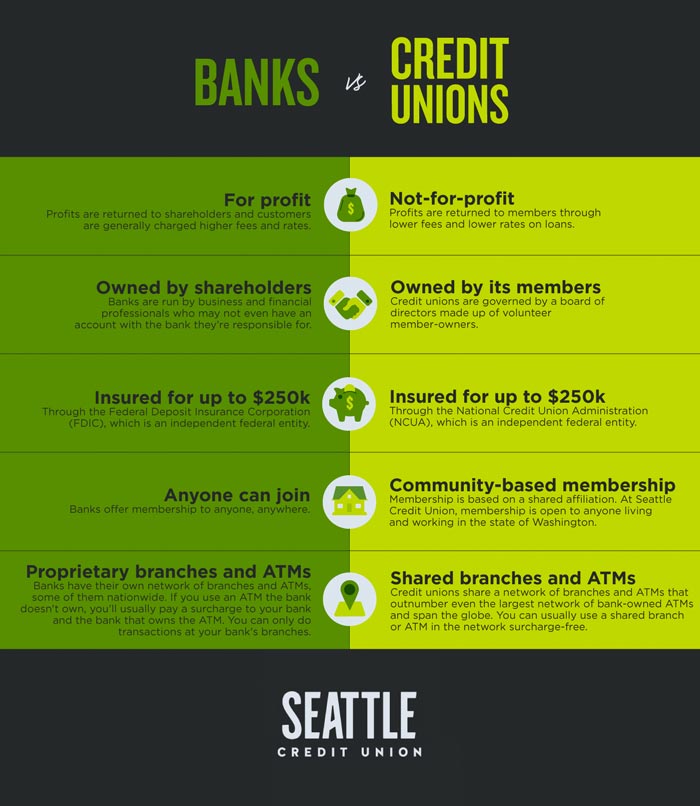Credit Union in Wyoming: Discover the Perks of Member-Focused Banking
Credit Union in Wyoming: Discover the Perks of Member-Focused Banking
Blog Article
The Ultimate Overview to Recognizing Lending Institution

Credit score unions stand as one-of-a-kind economic entities, rooted in principles of common assistance and member-driven procedures. Beyond their foundational worths, recognizing the complex workings of credit report unions involves a much deeper expedition. Unwinding the complexities of subscription eligibility, the evolution of solutions provided, and the distinct advantages they bring needs a comprehensive assessment. As we browse through the ins and outs of cooperative credit union, an informative journey waits for to drop light on these member-focused institutions and exactly how they differ from traditional financial institutions.
What Are Cooperative Credit Union?
Cooperative credit union are member-owned financial institutions that use an array of banking solutions to their participants. Unlike traditional financial institutions, credit unions operate as not-for-profit companies, meaning their key focus is on offering their participants rather than making the most of revenues. Participants of a debt union typically share a common bond, such as functioning for the very same employer, belonging to the very same neighborhood, or being component of the same company.
One of the vital advantages of credit report unions is that they commonly offer higher rates of interest on interest-bearing accounts and reduced rate of interest on finances contrasted to banks. Credit Unions in Wyoming. This is due to the fact that debt unions are structured to benefit their members straight, allowing them to hand down their revenues in the kind of much better prices and fewer fees. In addition, debt unions are understood for their customized client service, as they focus on constructing partnerships with their members to comprehend their special financial demands and goals
History and Advancement of Lending Institution
The roots of member-owned financial cooperatives, known today as cooperative credit union, trace back to a time when communities sought alternatives to typical financial institutions. The idea of cooperative credit union originated in the 19th century in Europe, with Friedrich Wilhelm Raiffeisen commonly attributed as the pioneer of the participating financial movement. Raiffeisen founded the very first identified credit rating union in Germany in the mid-1800s, stressing community support and self-help concepts.
The evolution of lending institution continued in North America, where Alphonse Desjardins developed the first lending institution in Canada in 1900. Shortly after, in 1909, the first united state cooperative credit union was formed in New Hampshire by a team of Franco-American immigrants. These very early credit unions operated the fundamental concepts of shared assistance, democratic control, and member possession.
Gradually, cooperative credit union have actually grown in appeal worldwide because of their not-for-profit structure, concentrate on serving members, and supplying competitive monetary services and products. Today, cooperative credit union play a crucial role in the financial sector, offering easily accessible and community-oriented financial options for sites individuals and businesses alike.

Membership and Eligibility Requirements
Subscription at a credit history union is usually limited to individuals fulfilling details qualification criteria based on the organization's starting concepts and regulative demands. Some credit history unions might only serve individuals that work or live in a certain location, while others might be tailored to workers of a particular firm or members of a particular association.
Furthermore, cooperative credit union are structured as not-for-profit companies, implying that their main objective is to serve their members as opposed to produce profits for shareholders. This concentrate on member solution frequently equates right into more individualized interest, lower charges, and affordable rate of interest on cost savings and car loans accounts. By fulfilling the eligibility standards and ending up being a participant of a cooperative credit union, individuals can access a series of economic items and services customized to their particular needs.
Providers and Products Offered
One of the essential elements that establishes credit rating unions apart is the varied range of economic solutions and products they use to their participants. Credit scores unions normally give traditional banking solutions such as financial savings and examining accounts, lendings, and credit history cards.
Furthermore, debt unions often give hassle-free online and Discover More mobile financial choices for members to quickly manage their finances. They may offer perks such as shared branching, allowing members to access their accounts at other cooperative credit union throughout the nation. Some cooperative credit union additionally supply insurance policy items like vehicle, home, and life insurance to help members protect their possessions and liked ones.

Benefits of Financial With Credit Scores Unions
When thinking about banks, exploring the benefits of financial with lending institution reveals distinct benefits for members seeking tailored solution and competitive rates. One substantial advantage of lending institution is their focus on customized client service. Unlike large banks, debt unions are member-owned and prioritize building solid relationships with their participants. This means that lending institution staff frequently have a much deeper understanding of their participants' monetary needs and can offer customized options to assist them accomplish their goals. Additionally, lending institution are understood for using affordable rate of interest on financial savings and finances accounts. Because they are not-for-profit companies, cooperative credit union can usually supply lower financing rates, greater savings prices, and reduced charges compared to typical banks. This can cause considerable cost savings for participants gradually. Overall, financial with a credit union can supply an extra customized, cost-effective, and member-centric monetary experience.
Verdict
In final thought, credit score unions stand out as member-owned economic organizations that prioritize serving their participants over making best use of earnings. With origins dating back to 19th century Europe, credit history unions comply with principles of common help and member ownership.
Credit unions are member-owned economic establishments that use a variety of banking services to their participants. The principle of credit scores unions come from in the 19th century in Europe, with Friedrich Wilhelm Raiffeisen often attributed as the leader of the cooperative financial motion.The development of credit rating unions proceeded visit site in North America, where Alphonse Desjardins established the very first credit history union in Canada in 1900. Credit rating unions commonly offer traditional banking solutions such as savings and examining accounts, fundings, and credit rating cards.When taking into consideration financial establishments, exploring the benefits of financial with credit history unions discloses distinct advantages for members looking for personalized solution and affordable rates.
Report this page